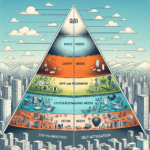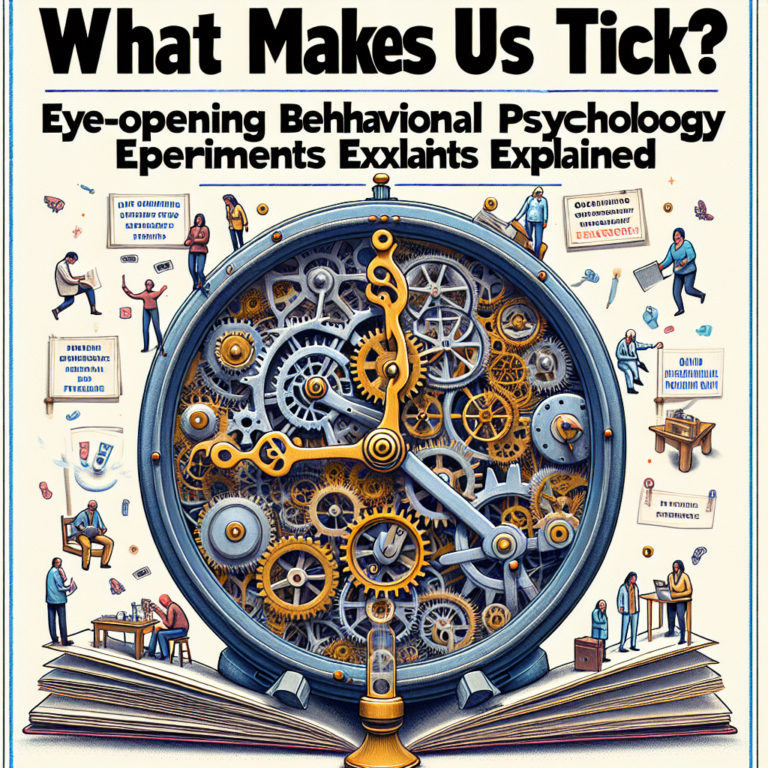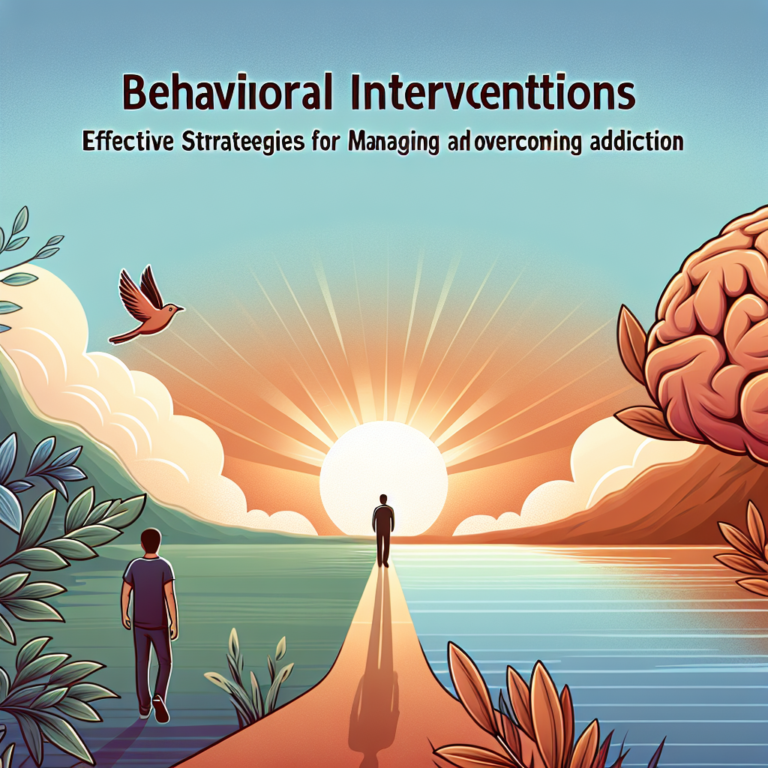
Inside the Mind: Unpacking Behavioral Psychology Through Case Studies for Ultimate Insights
Introduction: The Power of Understanding Behavior
In a world driven by rapid technological advancement and constant social change, understanding human behavior is more crucial than ever. Behavioral psychology, a field dedicated to deciphering how and why we act the way we do, provides invaluable insights that can shape personal choices, organizational success, and societal norms. Inside the Mind: Unpacking Behavioral Psychology Through Case Studies serves as an essential journey through the intricacies of human behavior, taking a closer look at real-world applications through compelling case studies. This exploration not only highlights the relevance of psychological principles but also unveils the transformative potential of these insights—making it a must-read for anyone interested in the motivations that drive us.
The Foundation of Behavioral Psychology
What is Behavioral Psychology?
Behavioral psychology, or behaviorism, emerged in the early 20th century, driven by the belief that all behaviors are acquired through conditioning. This field emphasizes observable actions over internal processes, arguing that our environment shapes our reactions. By studying behavior in a structured way, psychologists can identify patterns that reveal deeper insights into human decision-making.
Key Principles of Behavioral Psychology
- Reinforcement vs. Punishment: Positive or negative reinforcements can lead to the repetition or cessation of behaviors.
- Conditioning: Both classical and operant conditioning play key roles in shaping our responses and habits.
- Observational Learning: People often learn by observing others, which emphasizes the social aspect of behavior.
Case Study: Pavlov’s Dogs
One of the seminal case studies in behavioral psychology is Ivan Pavlov’s experiment with dogs. Pavlov discovered that dogs could be conditioned to salivate at the sound of a bell, anticipating food. This fundamental experiment illustrates classical conditioning and has far-reaching implications for understanding learned behaviors.
Analysis of Case Study
The significance of Pavlov’s work can’t be overstated; it laid the groundwork for later theories about behavior modification, particularly in clinical settings. Through varying reinforcement schedules, professionals can promote desired behaviors in patients, demonstrating the lasting relevance of Inside the Mind: Unpacking Behavioral Psychology Through Case Studies.
Real-World Applications of Behavioral Psychology
Behavioral Economics: The Psychology of Decision-Making
Behavioral economics blends psychology and economics to understand decision-making under uncertainty. This approach accounts for the cognitive biases that can lead people to make irrational choices.
Case Study: The Ultimatum Game
In the Ultimatum Game, two players must decide how to divide a sum of money. If one player offers a low amount, and the other player rejects the offer, neither receives anything. This game demonstrates that people are willing to forgo monetary gain to punish unfairness.
Relevance to Behavioral Psychology
The Ultimatum Game illustrates how emotions such as anger and justice can influence economic behavior, reinforcing the necessity of Inside the Mind: Unpacking Behavioral Psychology Through Case Studies for understanding human decisions beyond mere logic.
| Study Parameter | Player A’s Offer | Player B’s Response | Outcome |
|---|---|---|---|
| Offer: $10 | $1 | Rejected | $0, $0 |
| Offer: $10 | $5 | Accepted | $5, $5 |
| Offer: $10 | $9 | Accepted | $9, $1 |
Marketing Strategies: Understanding Consumer Behavior
Marketers leverage behavioral psychology to create campaigns that tap into consumer emotions and predictable behaviors. Techniques that appeal to our biases can significantly drive purchasing decisions.
Case Study: The IKEA Effect
The IKEA effect suggests that consumers place a higher value on products they help create. Shoppers who assemble their furniture often enjoy it more than pre-assembled options, increasing perceived value and customer loyalty.
Application Insight
This phenomenon illustrates the power of engagement, making it clear how Inside the Mind: Unpacking Behavioral Psychology Through Case Studies offers marketers a formula for success. By promoting a sense of ownership, brands can foster deeper connections with their audiences.
Understanding Habit Formation
The Science of Habit: Cue-Routine-Reward
Habits are central to our daily lives, often influencing our health, productivity, and more. The cue-routine-reward loop outlines the process through which habits are formed and maintained.
Case Study: The "Habit Loop"
Charles Duhigg, in his book "The Power of Habit," reveals the habit loop of a successful athlete. For instance, a runner may see their running shoes (cue), jog (routine), and afterward enjoy the rush of endorphins (reward). This cycle can be adapted to create healthier habits.
Takeaways from the Habit Loop
By understanding the stages of habit formation, individuals can actively change their routines, highlighting the significance of Inside the Mind: Unpacking Behavioral Psychology Through Case Studies in self-improvement initiatives.
| Habit Loop Component | Example |
|---|---|
| Cue | Seeing running shoes |
| Routine | Going for a jog |
| Reward | Feeling energized |
Behavioral Interventions: Changing Mindsets
The Role of Nudges
Nudging is a behavioral intervention designed to subtly steer people toward beneficial behaviors without restricting freedom of choice. Understanding this concept is crucial in areas like public health and environmental conservation.
Case Study: The Healthy Food Nudge
A school cafeteria redesigned its layout to place healthier food options at the front, increasing student consumption of fruits and vegetables by 25%. This simple nudge created a significant behavioral change without limiting choices.
Impact of Nudges
The effectiveness of nudges illustrates a fundamental principle of Inside the Mind: Unpacking Behavioral Psychology Through Case Studies: small environmental changes can lead to massive shifts in behavior over time.
Conclusion: Navigating the Complex Terrain of Human Behavior
Behavioral psychology offers an extensive toolkit for understanding what drives us. Whether it’s exploring the reasons behind consumer choices, the formation of habits, or implementing effective interventions, the case studies discussed in this article provide a vivid picture of the real-world implications of these principles. Inside the Mind: Unpacking Behavioral Psychology Through Case Studies not only highlights the significance of understanding behavior but also inspires readers to apply these insights in their personal and professional lives.
FAQs About Behavioral Psychology
1. What is behavioral psychology?
Behavioral psychology focuses on the study of observable behaviors rather than internal mental states. It explores how behavior is learned and reinforced through interaction with the environment.
2. How can I apply behavioral psychology in my daily life?
You can apply behavioral psychology by using the principles of reinforcement, recognizing triggers for your habits, and creating nudges to promote healthier behaviors or better decision-making.
3. Are there ethical considerations in behavioral interventions?
Yes, it’s important to consider the ethical implications of behavioral interventions, ensuring that they respect individual autonomy and promote genuinely beneficial outcomes.
4. Can behavioral psychology help improve mental health?
Absolutely! Many therapeutic approaches, including Cognitive Behavioral Therapy (CBT), are grounded in behavioral psychology. They leverage behavioral principles to promote healthier thinking patterns and coping strategies.
5. How does behavioral economics differ from traditional economics?
Behavioral economics incorporates psychological insights into human behavior to better understand economic decision-making. It challenges the assumption that individuals always act rationally in their best interest.
With this article, we’ve ventured Inside the Mind: Unpacking Behavioral Psychology Through Case Studies to explore the dynamic interplay between thoughts, feelings, and actions. The lessons learned from these case studies echo through various facets of life, offering guidance for improved understanding and better choices. Whether you’re aiming for personal growth or professional success, grasping these behavioral principles is the key to navigating the complexities of human nature.















